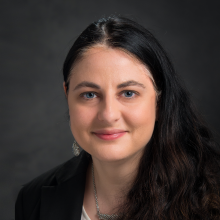May 2017 Spotlight on the SRCD Policy Fellow: Angelique Day, Ph.D., M.S.W
2016-2017 Federal Congressional Policy Fellow
As a congressional fellow, I am working in the office of Congressman Danny K Davis (IL). Congressman Davis is the ranking member of the Human Resources Subcommittee for the House Ways and Means Committee. This committee has jurisdiction over many poverty programs, including child welfare matters. As a mid-career scholar, I identify as a child maltreatment researcher. Specifically, my area of focus is youth aging out of foster care. As such, this personal office was an ideal placement for the expertise that I can bring to bear in the policy-making process.
I first learned about the SRCD fellowship in 2010 through another former fellow who was employed in the institution in which I received my master’s degree. Anxious about student loan debt when I graduated with my PhD in 2011, I chose to wait to apply for the fellowship until after I had a better handle on my financial obligations. There are many advantages to being a mid-career vs an early career fellow. Those of us who enter the fellowship as mid- career professionals from academe may have the opportunity to take advantage of a sabbatical during the fellowship year. As the fellowship is a full year, many fellows have to negotiate sabbatical pay at a lower rate over a full year rather than at full pay over one semester. Regardless, sabbatical pay can be used to subsidize the costs of housing and other living expenses beyond the stipend the fellowship pays. Mid-career scholars, who are not yet eligible for a sabbatical, can also apply for unpaid leave through their university of record. This eliminates any anxiety associated with job hunting so one can focus exclusively on the fellowship rather than one’s career future once the fellowship concludes.
I have had a long history of interest in application of research in the public policy process. Prior to entering academe, I worked for six years for a state-level, private, nonprofit children’s advocacy organization. In that position I oversaw the agency’s child welfare and education portfolios. The intersection between child welfare and education practice has been the focus of my research for the past six years. The findings of my dissertation research, which explored college access and retention rates of foster care youth, were used to educate my state legislature, and informed the development of a state appropriation that led to the funding of targeted student support service programs across the state.
As I have written extensively on this topic since completing my dissertation research, I have had an amazing opportunity in my fellowship to translate the implications for policy and practice sections of my published works into federal bills that have been or will be introduced in congress over my fellowship year. My first bill, which was Spotlight on the SRCD Fellow introduced on March 28, 2017, is HR 1757- the Trauma-Informed Care for Children and Families Act. This bill among other things, if passed, will improve pre-service training programs to prepare educators to work with students who have experienced trauma by expanding the teacher quality partnership grants under the Higher Education Act to include incentives for curricula focused on building trauma skills related to identification, support, interventions, and discipline.
In addition to bill writing, I have also had the great pleasure of assisting the Congressional and Senate Caucuses on Foster Youth with the planning and implementation of several legislative briefings. The first briefing, which focused on foster youth and access to higher education, was held in December 2016. The second, held in March 2017 focused on the issue of foster youth and the connection between education and access to meaningful and stable employment. The final briefing I will coordinate will focus on the problem of housing stability and how that has impeded education access.
The final project I have been working on that I am very proud of is a month-long, virtual media campaign entitled “fostering the future” which will focus on education and the myriad of barriers that foster youth face in accessing it. Throughout the month of May, this campaign will use high-impact digital storytelling to bring the voices of foster care alumni to the fore, to expose hard truths and to discuss public policy solutions that could be implemented to maximize the educational well-being of this vulnerable population.
My placement office has respected my expertise and has really allowed me to be very creative in utilizing the various mechanisms that exist to further public policy discussions in my areas of expertise. The fellowship path can be used to translate research to impact practice at a much faster pace than an academic’s traditional dissemination path, which includes conference presentations and publication in peer reviewed journals. Certainly these mechanisms are very important to the translational research process; however, participation in fellowships like what the SRCD organization offers can really be used to impact the child development/child maltreatment field in other very meaningful and exiting ways!
This experience has been life changing for me; it has truly been an honor to serve as an SRCD fellow in the U.S. House of Representatives over the 16-17 year.
